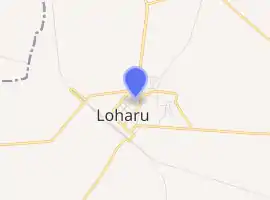Loharu Fort
Loharu Fort was built in the year 1570 CE by Thakur Arjun Singh.[1] Rao Shekha had originally divided Shekhawati into 33 thikanas, of which Loharu Fort was 33rd. It was then a small village with a kuccha, a mud fort, and stayed as such until 1800 CE.
| Loharu Fort | |
|---|---|

| |
| General information | |
| Status | Complete |
Conflicts
There have been 2 major battles fought over Loharu Fort. The first was in 1671 A.D between Thakur Madan Singh and the Mughal Governor of Hisar, and it was fought over the Land Revenue. The other was fought between the Thakur Kirat Singh and Raja Bhopal Singh of Khetri who claimed Loharu as part of Khetri. Raja Bhopal Singh was killed in the battle outside Loharu Fort, and a Chatri was built in his honor at the place where he was cremated, which is located about 1 km from the fort.
The Paragna then passed on to the state of Alwar and later became the Paragana under the state of Ferozpur Jhirka, which was ruled by Nawab Ahmed Baksh Khan in the year 1803. It was from this year forward that pukka construction of the mud fort and village started.
The Fort was in the hands of later Nawabs of Loharu until 1971 when the Late Nawab Aminuddin Ahmed Khan sold it to the Government of Haryana. Since these buildings were uninhabited, all the north-wing had collapsed as was part of the east-wing. Only the south-wing of the fort (containing the Farukh Manzil) survives, and that too went into a very dilapidated state.
Architecture
Over the years of the constructions Loharu Fort came to include an interesting blend of architecture. The south-wing of the fort contained the Diwan-E-khas and the Sheesh Mahal or The Room Of Mirrors, which has Mughal/Rajput style details. The central part of the south wing contained a large Victorian Style audience chamber and banquet hall. The right side of the south-wing consisted of the Zanana Mahal along with the kitchens. The left side of the south-wing was purely Mughal architecture. The east-wing was executed in the Delhi Haveli style which was considered very fashionable at the time and was distinct from the Shekhawati Havel.